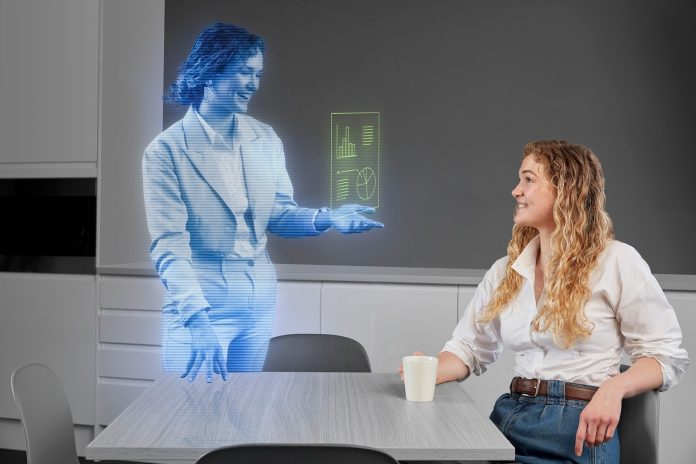A new study into the future of business has found 85% of SMEs are likely to adopt new technology in the next five years in order to support their growth. The Quantum Leap Report, by Virgin Money, revealed that two in five businesses (39%) plan to utilise data science, almost a third (31%) will use artificial intelligence, and over a quarter (26%) anticipate using virtual reality.
The research also found that while SMEs are aware of the rapid growth required for the future, 39% attribute a lack of time and 30% attribute a lack of money preventing them from using advanced technology. To find out how SMEs are embracing technology across a variety of industries, Virgin Money spoke to business owners from across the UK about their experiences.
Darren Sweetland, Managing Director of Mollie’s Motel & Diner, with locations in Bristol and Oxford, said: “For hospitality businesses, it’s absolutely critical that technology supports the guest experience; whether that be through enabling them to charge their electric vehicle or open the door to their hotel room. Technology isn’t always just guest facing, for example by reducing time and effort for Mollie’s operational teams by simplifying and automating as many routine tasks as possible enables the business to focus their time on the guest.
“We’ve created a pioneering system that supports the brand’s warm and friendly vibe, offering innovative tech without removing the human element. The result is an integrated ecosystem that is guest-focused, easy to train staff on, data-driven and operationally seamless whilst resilient and commercially affordable as Mollie’s scales its business.
“As our brand and footprint continues to grow, we will continue to innovate and invest in the optimal technology to create the perfect guest experience. Continuing to give the guest choice, for example, self service, some people love checking in and moving through the whole guest journey without interacting with our team members, whereas others like to stop and chat with our team about the area – choice has been one of the most important guest satisfaction factors in the business growing.”
Thomas De Garnham, Founder at Fireheart Coffee in Muswell Hill, London, said: “Historically automation has been viewed in a negative way by the specialty coffee industry, but due to the UK wide staff shortages, automation is now becoming more common and accepted in the industry. At Fireheart, we implemented cutting edge roasting software and hardware when we launched the business. Automation is definitely something we expect to see more of in the coffee sector in the coming years, which may in turn lead to the first cafes without staff or Baristas!”
Simon Wood, Founder of The Warm Welly Company in Cumbria said: “Technology has allowed us to vastly improve our website since we started the business in 2012. Our website was very basic to begin with and was essentially just an order taking platform. Now the site has better accessibility and is linked to our banking, Quickbooks accounting, Facebook and Google for marketing, and Royal Mail for dispatch.
“As we operate in a rural area, the most important technology for us is quite simple- fast and reliable wireless broadband! We’re too far from our nearest fibre hub to get good cable broadband and without a decent connection we can’t operate. In the future, we’re hoping to introduce technology to improve our tracking of customers and visitors to the website, which will help us to understand their journey better and increase sales conversions. If money were no object, we’d also like to implement better barcode technology to improve stock control.”
Rob Williams, Director of Hawthorn, clothing manufacturers based in London, said: “In recent months we have adopted 3D clothing design, whereas previously, we only worked with tech packs which are 2D documents. Tech packs give a clothing manufacturer all of the information they need to produce an item, but using 3D models gives great benefits in terms of perfecting the fits and fabrics that will be used, before anything is produced in reality.
“This is very beneficial in terms of virtual prototyping, and allows us and our customers to save time and money by only producing physical samples when we’re confident in the design. Streamlining processes like this makes us far more efficient as a business and is proving itself to be an invaluable tool in exceeding the expectations of our customers.
“Virtual reality and digital fashion are things that are going to make a great impact soon, and offer huge benefits to clothing brands, manufacturers and retailers. VR is already starting to come onto the scene in the world of fashion – think of trying sunglasses on before you buy, for example. VR gives the consumer a better service, allowing them to see how an item would look on them before making a purchase. It also offers a huge benefit to the retailer as it greatly decreases return rates, something that every fashion brand has seen rise since Covid due to the increased numbers of people buying online.”
Kash Ahmad, Head of Business Banking at Virgin Money, said: “Our research reveals that SMEs are busy and have a lack of time to invest, so they want a partner who can help them access financial information and solutions quickly and efficiently to help their future growth. That’s why we’ve created M-Track, which provides an online dashboard for customers to track their business’ health by combining their business current account data, accountancy software, e-commerce platform and other business tools.”
Access the full report here


